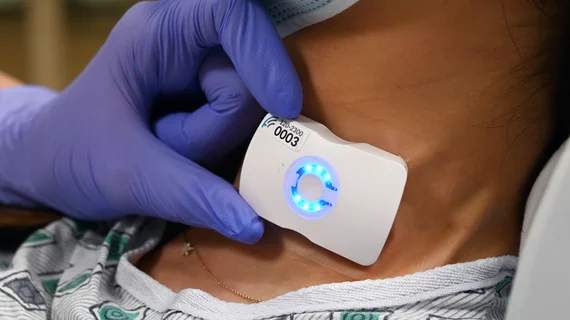Wireless ultrasound device helps manage treatment in patients with sepsis
New ultrasound technology that monitors blood flow in real time recently made its official debut in clinical settings at the El Camino Health system in California.
FloPatch is a wireless, wearable, FDA-approved doppler ultrasound system that attaches directly to a patient’s neck to continuously monitor carotid blood flow during intravenous fluid therapy administered to combat the onset and progression of sepsis. El Camino Health is the first hospital system to implement the device in clinical practice, which has been well received by the nursing staff there, according to Cheryl Reinking, chief nursing officer at El Camino Health.
“Timing is crucial when caring for patients with sepsis. Our nurses have seen firsthand how effective FloPatch is in monitoring the effectiveness of treatment in deteriorating patients, especially those with sepsis and low blood pressure,” Reinking said in a prepared statement. “Our nurses immediately loved it and helped decide where in the hospital the technology would be the best fit.”
After being applied to patients, the device wirelessly transmits real-time data detailing their blood flow through an application, where providers can access the results and use them to guide clinical decisions on whether to increase or decrease IV fluids. The process takes around one minute—much less time than traditional methods of monitoring fluid responses.
A recent study that deployed the device concluded that its use detected between four to five instances of fluid overload out of every 10 patients presenting to the emergency department for suspected sepsis, resulting in a change in treatment plans.
Flosonics Medical CMO Jon-Emile Kenny, MD, commented on the device’s introduction into clinical practice, sharing his enthusiasm for partnering with El Camino Health.
“We’re thrilled to partner with El Camino Health to launch this pioneering ultrasound technology,” Kenny said in a prepared statement. “FloPatch is more than an innovative ultrasound system; it is a new paradigm linking physiology and resuscitation medicine.”
More information on the device can be found here.

